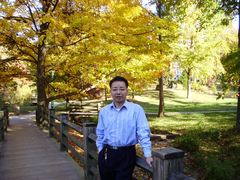
姓名:庞维国
联系电话:021-62232910
电子邮箱:wgpang@psy.ecnu.edu.cn
通讯地址:上海市中山北路3663号 华东师范大学心理与认知科学学院
研究方向:自主学习, 创新学习,学习拖延,教学设计,中国传统智力理论

庞维国,1970年10月生,山东莒南人,华东师范大学心理与认知科学学院副院长、教授、博士生导师,校教学委员会委员,上海市立德树人心理学重点研究基地主任。主要学术兼职有:教育部中小学心理健康教育专家指导委员会委员,中国心理学会理事,上海市心理学会副理事长兼秘书长,《心理科学》杂志编委,《International Journal of Creativity and Problem Solving》杂志编委。
主要研究领域为学习心理学、教学心理学和教学设计,先后承担教育部人文社会科学、上海市哲学社会科学、国家社科基金等多项课题研究项目,曾获高等教育国家级优秀教学成果奖、上海市哲学社会科学优秀成果奖、上海市教育科学优秀成果奖、全国教育硕士优秀教师奖。2009年入选上海市“浦江人才计划”,2012年入选教育部“新世纪优秀人才支持计划”。主讲课程包括《学习心理学》、《教育心理学》、《教学设计原理》、《教育心理学史》等,其中视频课程《学习心理学》为“中国大学公开课”首批上线的20门课程之一。
Selected Publications
Wang, Q., Law, H. C., Li,Y., Xu, Z., & Pang, W. (2017). Awareness and Awakening: A Narrative-Oriented Inquiry of Undergraduate Students' Development of Mindful Agency in China. Frontiers in Psychology, vol.8, DOI: 10.3389/fpsyg.2017.02036
Han, J., Long, H. & Pang, W. * (2017). Putting Raters in Ratees’ Shoes: Perspective Taking and Assessment of Creative Products. Creativity Research Journal, 29(3), 270-281.
Xu, X., Lou, L., Wang, L., & Pang, W.* (2017). Adolescents’ perceived parental psychological control and test anxiety: Mediating role of academic self-efficacy. Social Behavior and Personality: An International Journal, 45(9), 1573–1584.
Liu, W., Pan, Y., Luo, X., Wang. L, & Pang, W. * (2017). Active procrastination and creative ideation: The mediating role of creative self-efficacy. Personality and Individual Differences, 119, 227-229.
Pang, W., Esping, A. & Plucker, J. A. (2017). Confucian conceptions of human intelligence. Review of General Psychology, 21(2), 1-9.
Wang, L., Xu, X., Wang, Q. Healey, G., Su, L. & Pang, W. *(2017) . Are individuals with schizophrenia or schizotypy more creative? Evidence from multiple tests of creative potential. Creativity Research Journal, 29(2), 1–12.
Long, H. & Pang, W. *(2016). Family socioeconomic status, parental expectations, and adolescents’ academic achievements: a case of China. Educational Research and Evaluation, 22(5-6), 283-304.
Wang, Q., Li, H. & Pang, W. (2016).From PBL tutoring to PBL coaching in undergraduate medical education: an interpretative phenomenological analysis study. Medical Education Online, 2016, 21: 31973 - http://dx.doi.org/10.3402/meo.v21.31973.
Wang, Q., Li, H., Pang, W., Shuo, L. & Su, Y. (2016). Developing an integrated framework of problem-based learning and coaching psychology in undergraduate medical education: A participatory research. BMC Medical Education, 16(2), 1-14.
Pang, W. (2015). Promoting creativity in the classroom: A generative view. Psychology of Aesthetics, Creativity and the Arts, 9(2), 122-127.
Long, H., & Pang, W. *(2015). Rater effects in creativity assessment: A mixed methods investigation. Thinking Skills and Creativity, 15,13-25.
Long, H., Pang, W.*, & Ren,Y.(2015).Is China Shanghai? A picture of Chinese students' math studies and achievement.2015 AERA Annual Meeting,Chicargo.
Jiang,Y., Pang,W., & Bonner, P.J.(2014). Self-Regulated Learning Among Secondary School Students in China. 2014 AERA Annual Meeting, Philadelphia, Pennsylvania.
Pang,W. (2012). The Actiotope Model of Giftedness: A useful model for examining gifted education in China's universities. High Ability Studies, 23(1), 89-91.
Pang,W. & Plucker,J. A. (2012). Recent Transformations in China's Economic, Social, and Educational policies for promoting innovation and creativity. The Journal of Creative Behavior, 46(4), 247-273.
Pang,W., Sun, Y.,& Zhu, H.(2012). Who Entered the Better Schools? The Socioeconomic Status of Chinese Families and the Impact on the Students’ School Choice. 2012 AERA Annual Meeting, Vancouver.
